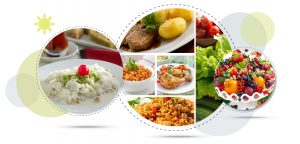

Amid the taboo to eliminate sodium intake through bottled water, nutritionist Riham Shamseddine explains that it is completely safe and healthy to consume a moderate amount of sodium to maintain well-balanced diet.


With long fasting hours and the intense heat of the summer, it is very important for individuals in Ramadan to take extra precautions when dealing with their water consumption patterns. This will help ensure they remain healthy, hydrated and balanced throughout the holy month.
Shamseddine explained that the over-consumption of sodium mainly comes from food and preserved items such as ready-to-eat-meals, frozen meals, deli meats, cooking stocks and other food items. Therefore; it became a warning label to limit the amount of sodium in our daily intake from food and drinks.
However, a 500ml bottle of natural water from an underground source contains only 10 mg of sodium, and accounts for only 2.6% of the 2300 mg of Sodium recommended by AHA for a healthy adult, taking into consideration an intake of 2-3 liters of water per day.
According to Shamseddine, restricting the sodium intake by severe amounts could potentially lead to hypernatremia (low sodium), which causes symptoms such as muscles cramps, headaches, fatigue, nausea and even more serious conditions such as confusion, hallucinations and decreased consciousness.
Fasting for more than 15 hours a day puts our body in a state of dehydration, as water is critical for a variety of normal and vital functions making 60-70% of our total body weight. “It is highly essential to consume an adequate amount of bottled water during Ramadan to prevent common side effects such as constipation, headaches, dizziness and dry skin”, added Shamseddine.
The adequate intake of fluids as recommended by the Institute of Medicine is equivalent of 3 liters for males and 2.3 liters for females. That said caffeinated beverages such as coffee, tea, and soft drinks do not account in the daily intake of fluids, the nutritionist commented.
It is always important to balance your dietary intakes, which include adequate amount of bottled water, and not consuming excessive processed foods, to maintain healthy blood pressure level and body functions, Riham advised.
The nutritionist is recommending the below top guidelines to help minimize thirst, stay hydrated and minimize the risk of water retention during Ramadan:
RIYADH, June 2 – Ellora Group, a leading Doha-based distributor of building materials and industrial fasteners,…
DUBAI – President Donald Trump’s recently concluded visit to the Gulf Cooperation Council (GCC) countries has…
DUBAI – Dubai’s music scene is set to sizzle this June with a lineup of international…
DUBAI – The United Arab Emirates is set to host a vibrant array of events this…
ABU DHABI– Etihad Airways, the national airline of the United Arab Emirates, has entered into…
RIO DE JANEIRO – Carlo Ancelotti has officially arrived in Brazil to commence his role as…